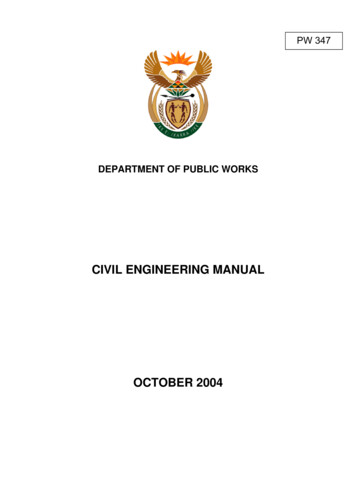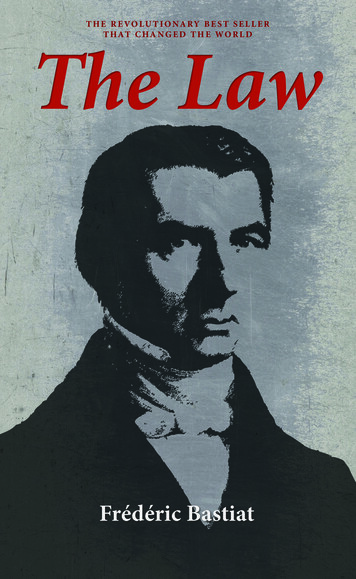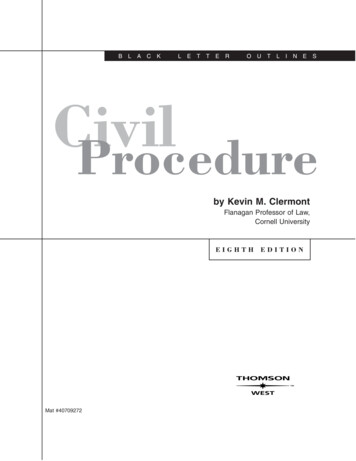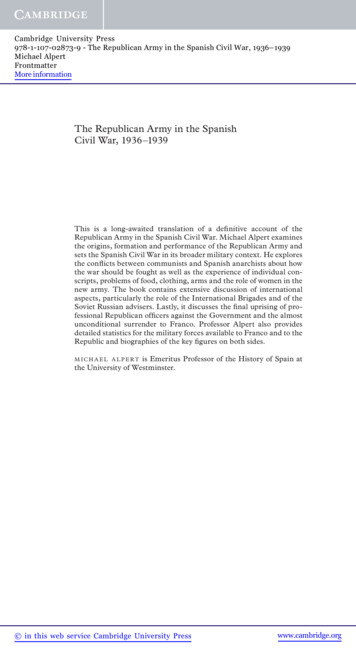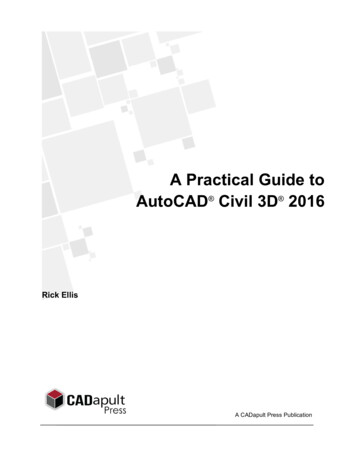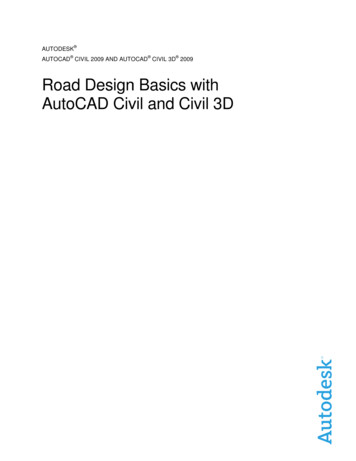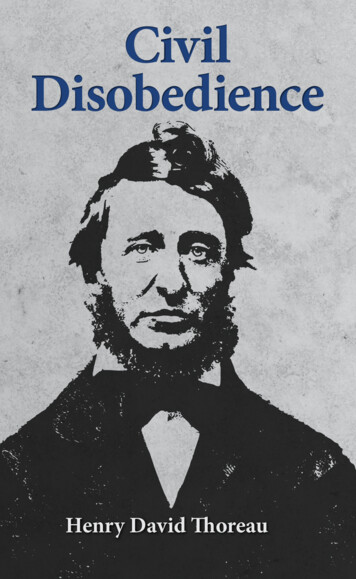
Transcription
CivilDisobedienceHenry David Thoreau
CivilDisobedienceHenry David ThoreauForeword by Connor BoyackLibertas InstituteSalt Lake City, Utah
Civil DisobedienceThoreau’s essay is out of copyright and in the public domain; thisversion is lightly edited for modernization. Supplemental essays arecopyrighted by their respective authors and included with permission.The foreword is licensed under a Creative Commons AttributionShareAlike 3.0 Unported License.LIBERTAS PRESS770 E. MAIN STREET, SUITE 255LEHI, UT 84043Civil Disobedience / Henry David Thoreau — 1st ed.First printing, June 2014Cover Design by Ben JenkinsManufactured in the United States of AmericaFor bulk orders, send inquiries to: info@libertasutah.orgISBN-13: 978-0-9892912-3-1
dedicated toEdward Snowdenfor doingwhat was right
“The most foolish notion of all is the belief thateverything is just which is found in the customsor laws of nations. Would that be true, even ifthese laws had been enacted by tyrants?”“What of the many deadly, the many pestilentialstatutes which nations put in force? These nomore deserve to be called laws than the rulesa band of robbers might pass in their assembly.For if ignorant and unskillful men have prescribeddeadly poisons instead of healing drugs, thesecannot possibly be called physicians’ prescriptions;neither in a nation can a statute of any sort becalled a law, even though the nation, in spite ofbeing a ruinous regulation, has accepted it.”—Cicero
Forewordby Connor BoyackAmericans know Henry David Thoreau as theauthor of Walden, a narrative published in 1854 detailingthe author’s life at Walden Pond, on property ownedby his friend Ralph Waldo Emerson near Concord,Massachusetts. Thoreau spent two years living a socialexperiment, escaping what he called “over-civilization” insearch of the “raw” and “savage delight” of the wilderness.“I went to the woods because I wished to livedeliberately,” Thoreau writes. “I wanted to live deep andsuck out all the marrow of life—to live so sturdily andSpartan-like as to put to rout all that was not life ”The experiment was, in effect, an attempt to transformEmerson’s theoretical Transcendentalism—the belief thatpeople are at their best when they are self-reliant andindependent, rising above society and its institutions—into a practical, daily lifestyle.“To be a philosopher,” he explained in Walden, “isnot merely to have subtle thoughts, nor even to found aschool, but so to love wisdom as to live according to itsdictates, a life of simplicity, independence, magnanimityand trust. It is to solve some of the problems of life, notonly theoretically, but practically.”This intellectual fidelity to basic principles foundapplication in every aspect of his life, including hisinteraction with government. One year into his two-yearexperiment, the local tax collector confronted Thoreauand asked him to pay six years of delinquent poll taxes.Thoreau refused, due to his opposition to the Mexicanv
American War and slavery, and was subsequentlyincarcerated.“Must the citizen resign his conscience to thelegislator?” he asked in the essay now called “CivilDisobedience.” “Why has every man a consciencethen? I think that we should be men first, and subjectsafterward.” Thoreau’s distinction was made even clearer:“It is not desirable to cultivate a respect for the law, somuch as for the right.” To Thoreau, laws were only worthyof respect and allegiance when they did not violate one’sconscience—when they were right.Thoreau pondered why so many people obey lawswithout questioning them to consider whether theywere just. He also explored why some still obey lawseven when they think they are wrong. This is no smallmatter of importance—for example, over 260 millionpeople were killed by agents of their own government inthe 20th century alone. Throughout history people havesubmitted to, and carried out, the decrees of dictatorsand despots. The tragic history of the world is one ofdeference to, and abuse of, political authority.And it’s not just active combat in which we observethis truth. Consider the tens of thousands of employeesof the federal government who knew that the NationalSecurity Agency was spying on innocent Americans.These employees had clearance by which to receive suchconfidential information, and yet they all remainedcomplicit in invading the privacy of their fellow citizens.More disturbingly—and unsurprisingly, Thoreau mightsay—they continued to show up for work after EdwardSnowden brought these activities to the public’s attentionand heightened our collective awareness of, and objectionto, the NSA’s work. Do they believe that their actions arejust? For those who do not, why don’t they quit? Whyhaven’t dozens more followed in Snowden’s footsteps?vi
Thoreau’s objections seem almost laughable incomparison to the size and scope of government today.“I meet this American government face to face, oncea year—no more—in the person of its tax gatherer,”he wrote. And even then, he was faithful enough tohis conscience that he did not rationalize its violationsimply because it was infrequent or relatively minor. Inour day, interactions with the government are far morenumerous and invasive. Police officers invade our homesusing military tactics and tools, often harming or killinginnocent people or pets. IRS agents shake down thepublic for far more than a comparatively petty poll tax;combining income, sales, property, gas, social security,and other taxes, the average U.S. citizen pays around onethird of his income to the state. Various federal agenciesdictate what is and is not acceptable to ingest, deprivingneedy people of the medications and substances theyrequire. Bureaucrats oversee occupational licensureprocesses in which the state requires a permission slip inorder to work. It imprisons people who have not violatedany person’s rights simply because they have actedcontrary to a legislative edict. This list could continue tothe point of filling volumes—but you get the picture.“Unjust laws exist,” Thoreau observed, asking “shallwe be content to obey them, or shall we endeavor toamend them, and obey them until we have succeeded, orshall we transgress them at once?” How do you respond?Read that question again and think about it for a minute.Perhaps you’ll reply that the costs of defying the laware too high—that as an individual you would risk jailtime, or that a group effort might lead to open conflict,including bloodshed. To you, Thoreau responds: “Isthere not a sort of bloodshed when the conscience iswounded? Through this wound a man’s real manhoodvii
and immortality flow out, and he bleeds to an everlastingdeath. I see this blood flowing now.” Armed hostilities area fearful thing, but Thoreau encourages us to think of thesouls dying each day on the battlefield of life by actingcontrary to what they know to be right.Thoreau was not an anarchist; he did not opposeauthority as a rule. Rather, he opposed injustice. Ajust government, he wrote, “must have the sanctionand consent of the governed. It can have no pure rightover my person and property but what I concede to it.”His essay notes how the American colonists rebelledagainst their mother country and, as an application ofthe philosophy behind their actions, discusses whenrebellion is justified—a question as relevant in ourmodern age as it was in Thoreau’s time.We have also included a few brief essays in this book,including one by Howard Zinn, an American historianand activist. Its message is synonymous with Thoreau’s:society’s problem today, according to Zinn, is not civildisobedience but civil obedience. To get back to thefounding principles, as articulated in the Declaration ofIndependence, Zinn argues that “we are going to need togo outside the law, to stop obeying the laws that demandkilling or that allocate wealth the way it has been done, orthat put people in jail for petty technical offenses and keepother people out of jail for enormous crimes.” Unjust laws,both authors would argue, are not worthy of support.Thoreau was only jailed for one evening; a relativepaid his “debt” to the state and thus freed him—despite Thoreau’s objections. Returned to his socialexperiment—he would argue that the incarcerationwas not an interruption, but part of it—children in thenearby area asked Thoreau to hunt for huckleberries withthem. It was one of his favorite pastimes. He joined them,viii
and enjoyed the experience. He was in nature, living.Standing on one of Concord’s highest hills, presumablysoaking in the surrounding sights, we imagine Thoreaulooking around him with a chuckle as he observes in hisessay that “the state was nowhere to be seen.”Some are so intoxicated by the state—its mandates,its promises, its provisions—that they could neverfathom being so disconnected as Thoreau sought tobecome. Some are “so completely within the institution”of the state that they “never distinctly and nakedly beholdit,” he says. Few realize that this raw power is as unjust asit is, and violates the consciences of so many. “They arewont to forget,” writes Thoreau, “that the world is notgoverned by policy and expediency.” Government, inessence, does not make the world go ‘round.It seems like a simple statement, yet we must wonderwith Thoreau why more people do not live according totheir consciences. Why are people willing to do throughthe state what they are unwilling to do to their neighborsdirectly? “There are nine hundred and ninety-ninepatrons of virtue to one virtuous man,” says the author,“but it is easier to deal with the real possessor of a thingthan with the temporary guardian of it.” It’s not enough totalk about liberty or rage against the machine; those whowish to be free should not tolerate being partially free.Step away from the “over-civilization” and you’llnotice, with Thoreau, that the state is nowhere to be seen.His call to action is ours: act like it.ix
Civil DisobedienceHenry David ThoreauI heartily accept the motto, “That government is bestwhich governs least”; and I should like to see it acted upto more rapidly and systematically. Carried out, it finallyamounts to this, which also I believe—“That governmentis best which governs not at all”; and when men areprepared for it, that will be the kind of government whichthey will have.Government is at best but an expedient; but mostgovernments are usually, and all governments aresometimes, inexpedient. The objections which have beenbrought against a standing army—and they are manyand weighty, and deserve to prevail—may also at last bebrought against a standing government. The standingarmy is only an arm of the standing government. Thegovernment itself, which is only the mode that thepeople have chosen to execute their will, is equally liableto be abused and perverted before the people can actthrough it. Witness the present Mexican war,1 the workof comparatively a few individuals using the standinggovernment as their tool—for, in the outset, the peoplewould not have consented to this measure.This American government—what is it but atradition, though a recent one, endeavoring to transmititself unimpaired to posterity, but each instant losing someof its integrity? It has not the vitality and force of a singleliving man, for a single man can bend it to his will. It is asort of wooden gun to the people themselves. But it is not1U.S.-Mexican War (1846-1848); abolitionists considered it aneffort to extend slavery into former Mexican territory.1
the less necessary for this, for the people must have somecomplicated machinery or other, and hear its din, to satisfythat idea of government which they have. Governmentsshow thus how successfully men can be imposed on,even impose on themselves, for their own advantage. Itis excellent, we must all allow. Yet this government neverof itself furthered any enterprise, but by the alacrity withwhich it got out of its way. It does not keep the countryfree. It does not settle the West. It does not educate. Thecharacter inherent in the American people has doneall that has been accomplished, and it would have donesomewhat more if the government had not sometimesgot in its way. For government is an expedient by whichmen would fain succeed in letting one another alone and,as has been said, when it is most expedient, the governedare most let alone by it. Trade and commerce, if they werenot made of India rubber,2 would never manage to bounceover the obstacles which legislators are continually puttingin their way, and if one were to judge these men whollyby the effects of their actions, and not partly by theirintentions, they would deserve to be classed and punishedwith those mischievous persons who put obstructions onthe railroads.But, to speak practically and as a citizen, unlikethose who call themselves no-government men,3 I askfor, not at once no government, but at once a bettergovernment. Let every man make known what kind ofgovernment would command his respect, and that willbe one step toward obtaining it.After all, the practical reason why, when the2Made from the latex of tropical plants, “India” because it camefrom the West Indies, and “rubber” from its early use as an eraser.3 Anarchists, many of whom came from Massachusetts.2
power is once in the hands of the people, a majority arepermitted—and for a long period continue—to rule isnot because they are most likely to be in the right, norbecause this seems fairest to the minority, but becausethey are physically the strongest. But a government inwhich the majority rule in all cases cannot be based onjustice, even as far as men understand it. Can there notbe a government in which majorities do not virtuallydecide right and wrong, but conscience?—in whichmajorities decide only those questions to which the ruleof expediency is applicable? Must the citizen ever for amoment, or in the least degree, resign his conscience tothe legislator? Why has every man a conscience, then? Ithink that we should be men first, and subjects afterward.It is not desirable to cultivate a respect for the law, somuch as for the right. The only obligation which I havea right to assume is to do at any time what I think right.It is truly enough said that a corporation has noconscience; but a corporation of conscientious men is acorporation with a conscience. Law never made men awhit more just and, by means of their respect for it, eventhe well disposed are daily made the agents of injustice.A common and natural result of an undue respectfor law is that you may see a file of soldiers, colonel,captain, corporal, privates, powder-monkeys,4 and all,marching in admirable order over hill and dale to thewars, against their wills—ay, against their common senseand consciences—which makes it very steep marchingindeed, and produces a palpitation of the heart. Theyhave no doubt that it is a damnable business in whichthey are concerned; they are all peaceably inclined. Now,what are they? Men at all? Or small movable forts and4 Boys who carry gunpowder for soldiers.3
magazines at the service of some unscrupulous man inpower? Visit the Navy Yard, and behold a marine, sucha man as an American government can make, or suchas it can make a man with its black arts—a mere shadowand reminiscence of humanity, a man laid out alive andstanding, and already, as one may say, buried under armswith funeral accompaniments, though it may be“Not a drum was heard, not a funeral note,As his corse to the rampart we hurried;Not a soldier discharged his farewell shotO’er the grave where our hero we buried.”5The mass of men serve the state thus, not as menmainly, but as machines, with their bodies. They are thestanding army, and the militia, jailers, constables, possecomitatus,6 etc. In most cases there is no free exercisewhatever of the judgment or of the moral sense, butthey put themselves on a level with wood and earth andstones—and wooden men can perhaps be manufacturedthat will serve the purpose as well. Such command nomore respect than men of straw or a lump of dirt. Theyhave the same sort of worth only as horses and dogs.Yet such as these even are commonly esteemed goodcitizens. Others, as most legislators, politicians, lawyers,ministers, and office-holders, serve the state chieflywith their heads, and as they rarely make any moraldistinctions, they are as likely to serve the devil, withoutintending it, as God. A very few, as heroes, patriots,martyrs, reformers in the great sense, and men, serve thestate with their consciences also, and so necessarily resistit for the most part—and they are commonly treated asenemies by it. A wise man will only be useful as a man,5 Charles Wolfe (1791-1823) The Burial of Sir John Morre at Corunna.6 A group empowered to uphold the law; a sheriff ’s posse.4
and will not submit to be “clay,” and “stop a hole to keepthe wind away,”7 but leave that office to his dust at least:“I am too high-born to be propertied,To be a secondary at control,Or useful serving-man and instrumentTo any sovereign state throughout the world.”8He who gives himself entirely to his fellow menappears to them useless and selfish, but he who giveshimself partially to them is pronounced a benefactor andphilanthropist.How does it become a man to behave toward thisAmerican government today? I answer that he cannot,without disgrace, be associated with it. I cannot foran instant recognize that political organization as mygovernment which is the slave’s government also.9All men recognize the right of revolution—thatis, the right to refuse allegiance to (and to resist) thegovernment when its tyranny or its inefficiency aregreat and unendurable. But almost all say that such isnot the case now. But such was the case, they think, inthe Revolution of ‘75.10 If one were to tell me that thiswas a bad government because it taxed certain foreigncommodities brought to its ports, it is most probable thatI should not make an ado about it, for I can do withoutthem. All machines have their friction, and possibly thisdoes enough good to counterbalance the evil. At anyrate, it is a great evil to make a stir about it. But whenthe friction comes to have its machine, and oppressionand robbery are organized, I say, let us not have such7 Shakespeare (1564-1616) from Hamlet.8 Shakespeare, from King John.9 As an abolitionist, Thoreau strongly objectedto slavery’s legalprotection in certain states.10 The American Revolution began in Lexington & Concord in 1775.5
a machine any longer. In other words, when a sixth ofthe population of a nation which has undertaken to bethe refuge of liberty are slaves, and a whole country isunjustly overrun and conquered by a foreign army, andsubjected to military law, I think that it is not too soonfor honest men to rebel and revolutionize. What makesthis duty the more urgent is the fact that the country sooverrun is not our own, but ours is the invading army.11Paley, a common authority with many on moralquestions, in his chapter on the “Duty of Submissionto Civil Government,” resolves all civil obligation intoexpediency, and he proceeds to say that “so long as theinterest of the whole society requires it—that is, so longas the established government cannot be resisted orchanged without public inconveniency—it is the will ofGod that the established government be obeyed, and nolonger. This principle being admitted, the justice of everyparticular case of resistance is reduced to a computationof the quantity of the danger and grievance on the oneside, and of the probability and expense of redressing iton the other.”12 Of this, he says, every man shall judgefor himself.But Paley appears never to have contemplatedthose cases to which the rule of expediency does notapply, in which a people, as well as an individual, mustdo justice—cost what it may. If I have unjustly wresteda plank from a drowning man, I must restore it to himthough I drown myself. This, according to Paley, wouldbe inconvenient. But he that would save his life, in such a11 A reference to slavery in the United States and to the invasion ofMexico by the United States.12 William Paley (1743-1805), English theologian and philosopher,from Principles of Moral and Political Philosophy, 1785.6
case, shall lose it.13 This people must cease to hold slaves,and to make war on Mexico, though it cost them theirexistence as a people.In their practice, nations agree with Paley; but doesany one think that Massachusetts does exactly what isright at the present crisis?“A drab of state, a cloth-o’-silver slut,To have her train borne up, and her soul trail in thedirt.”14Practically speaking, the opponents to a reform inMassachusetts are not a hundred thousand politiciansat the South, but a hundred thousand merchants andfarmers here, who are more interested in commerceand agriculture than they are in humanity, and are notprepared to do justice to the slave and to Mexico, costwhat it may. I quarrel not with far-off foes, but with thosewho, near at home, co-operate with—and do the biddingof—those far away, and without whom the latter wouldbe harmless. We are accustomed to say that the mass ofmen are unprepared, but improvement is slow, becausethe few are not materially wiser or better than the many.It is not so important that many should be as good as you,as that there be some absolute goodness somewhere; forthat will leaven the whole lump.15There are thousands who are in opinion opposed toslavery and to the war, who yet in effect do nothing toput an end to them; who, esteeming themselves childrenof Washington and Franklin, sit down with their handsin their pockets and say that they know not what to do,and do nothing; who even postpone the question of13 “He that findeth his life shall lose it ” —Matthew 10:39.14 Cyril Tourneur (1575-1626), The Revengers Tragadie.15 “ a little leaven leaveneth the whole lump” —1 Corinthians 5:6.7
freedom to the question of free-trade, and quietly readthe prices-current16 along with the latest advices fromMexico, after dinner, and, it may be, fall asleep overthem both. What is the price-current of an honest manand patriot today? They hesitate, and they regret, andsometimes they petition—but they do nothing in earnestand with effect. They will wait, well disposed, for othersto remedy the evil, that they may no longer have it toregret. At most they give only a cheap vote, and a feeblecountenance and Godspeed, to the right, as it goes bythem. There are nine hundred and ninety-nine patronsof virtue to one virtuous man; but it is easier to deal withthe real possessor of a thing than with the temporaryguardian of it.All voting is a sort of gaming, like checkers orbackgammon, with a slight moral tinge to it—a playingwith right and wrong, with moral questions; and bettingnaturally accompanies it. The character of the voters isnot staked. I cast my vote, perchance, as I think right, butI am not vitally concerned that that right should prevail.I am willing to leave it to the majority. Its obligation,therefore, never exceeds that of expediency. Even votingfor the right is doing nothing for it. It is only expressing tomen feebly your desire that it should prevail. A wise manwill not leave the right to the mercy of chance, nor wishit to prevail through the power of the majority. There isbut little virtue in the action of masses of men. When themajority shall at length vote for the abolition of slavery, itwill be because they are indifferent to slavery, or becausethere is but little slavery left to be abolished by their vote.They will then be the only slaves. Only his vote can hasten16 A list of the prevailing prices of merchandise, stocks, specie, billsof exchange, etc.8
the abolition of slavery who asserts his own freedom byhis vote.I hear of a convention to be held at Baltimore,or elsewhere, for the selection of a candidate for thePresidency, made up chiefly of editors, and men whoare politicians by profession; but I think, what is itto any independent, intelligent, and respectable manwhat decision they may come to? Shall we not have theadvantage of his wisdom and honesty, nevertheless? Canwe not count upon some independent votes? Are therenot many individuals in the country who do not attendconventions? But no: I find that the respectable man,so called, has immediately drifted from his position,and despairs of his country, when his country has morereason to despair of him. He forthwith adopts one of thecandidates thus selected as the only available one, thusproving that he is himself available for any purposes ofthe demagogue. His vote is of no more worth than that ofany unprincipled foreigner or hireling native, who mayhave been bought.Oh for a man who is a man, and, as my neighborsays, has a bone in his back which you cannot pass yourhand through! Our statistics are at fault; the populationhas been returned too large. How many men are there to asquare thousand miles in this country? Hardly one. Doesnot America offer any inducement for men to settle here?The American has dwindled into an Odd Fellow17—onewho may be known by the development of his organof gregariousness, and a manifest lack of intellect andcheerful self-reliance; whose first and chief concern, oncoming into the world, is to see that the almshouses are17 A member of the Independent Order of Odd Fellows, a fraternalorganization orginating in England in the mid-1700s.9
in good repair; and, before yet he has lawfully donned thevirile garb, to collect a fund for the support of the widowsand orphans that may be; who, in short ventures to liveonly by the aid of the Mutual Insurance company, whichhas promised to bury him decently.It is not a man’s duty, as a matter of course, todevote himself to the eradication of any—even the mostenormous—wrong. He may still properly have otherconcerns to engage him, but it is his duty, at least, to washhis hands of it, and, if he gives it no thought longer, not togive it practically his support. If I devote myself to otherpursuits and contemplations, I must first see, at least,that I do not pursue them sitting upon another man’sshoulders. I must get off him first, that he may pursuehis contemplations too. See what gross inconsistencyis tolerated. I have heard some of my townsmen say, “Ishould like to have them order me out to help put downan insurrection of the slaves, or to march to Mexico—seeif I would go!” And yet these very men have each, directlyby their allegiance, and so indirectly, at least, by theirmoney, furnished a substitute. The soldier is applaudedwho refuses to serve in an unjust war by those whodo not refuse to sustain the unjust government whichmakes the war; is applauded by those whose own act andauthority he disregards and sets at naught—as if the statewere penitent to that degree that it hired one to scourgeit while it sinned, but not to that degree that it left offsinning for a moment. Thus, under the name of Orderand Civil Government, we are all made at last to payhomage to and support our own meanness. After the firstblush of sin comes its indifference, and from immoral itbecomes, as it were, unmoral, and not quite unnecessaryto that life which we have made.10
The broadest and most prevalent error requiresthe most disinterested virtue to sustain it. The slightreproach to which the virtue of patriotism is commonlyliable, the noble are most likely to incur. Those who,while they disapprove of the character and measures ofa government, yield to it their allegiance and supportare undoubtedly its most conscientious supporters,and so frequently the most serious obstacles to reform.Some are petitioning the State to dissolve the Union,18to disregard the requisitions of the President. Why dothey not dissolve it themselves—the union betweenthemselves and the State—and refuse to pay their quotainto its treasury? Do not they stand in the same relationto the State, that the State does to the Union? And havenot the same reasons prevented the State from resistingthe Union, which have prevented them from resistingthe State?How can a man be satisfied to entertain an opinionmerely, and enjoy it? Is there any enjoyment in it, if hisopinion is that he is aggrieved? If you are cheated out ofa single dollar by your neighbor, you do not rest satisfiedwith knowing that you are cheated, or with saying thatyou are cheated, or even with petitioning him to pay youyour due; but you take effectual steps at once to obtainthe full amount, and see that you are never cheatedagain. Action from principle—the perception and theperformance of right—changes things and relations; itis essentially revolutionary, and does not consist whollywith anything which was. It not only divides states andchurches, it divides families—ay, it divides the individual,separating the diabolical in him from the divine.18 “No Union with Slaveholders” had become a popularabolitionist slogan.11
Unjust laws exist; shall we be content to obeythem, or shall we endeavor to amend them, and obeythem until we have succeeded, or shall we transgressthem at once? Men generally, under such a governmentas this, think that they ought to wait until they havepersuaded the majority to alter them. They think that,if they should resist, the remedy would be worse thanthe evil. But it is the fault of the government itself thatthe remedy is worse than the evil. It makes it worse.Why is it not more apt to anticipate and provide forreform? Why does it not cherish its wise minority?Why does it cry and resist before it is hurt? Why doesit not encourage its citizens to be on the alert to pointout its faults, and do better than it would have them?Why does it always crucify Christ, and excommunicateCopernicus and Luther, and pronounce Washingtonand Franklin rebels?One would think that a deliberate and practicaldenial of its authority was the only offense nevercontemplated by government; else, why has it notassigned its definite, its suitable and proportionate,penalty? If a man who has no property refuses butonce to earn nine shi
wish to be free should not tolerate being partially free. Step away from the "over-civilization" and you'll notice, with !oreau, that the state is nowhere to be seen. His call to action is ours: act like it. 1 Civil Disobedience Henry David !oreau

